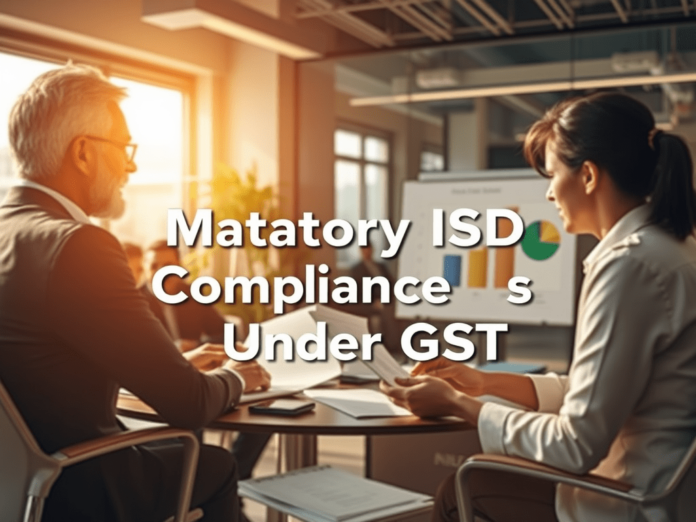Starting April 1, 2025, businesses must compulsorily register as an Input Service Distributor (ISD) under the Goods and Services Tax (GST) law. This means that if a company receives common services (like software, legal fees, or employee insurance) at its head office (HO) but uses them across multiple branches, it must distribute the Input Tax Credit (ITC) through the ISD mechanism.
Earlier, businesses could choose between cross-charging (raising an invoice between branches) or using ISD to allocate ITC. However, with this change, ISD registration is no longer optional—it is now mandatory.
What is ISD and Why is it Important?
An Input Service Distributor (ISD) is a registered office (usually the Head Office) that:
✅ Receives input service invoices from suppliers.
✅ Distributes the eligible ITC to branches based on their turnover.
Why is this important?
✔ Ensures fair distribution of tax credit across different branches.
✔ Prevents tax mismatches and compliance issues.
✔ Simplifies tax calculations by creating a clear system for ITC allocation.
Key Changes Effective April 1, 2025
🔹 1. Mandatory ISD Registration
- If a business procures common services centrally, it must register as an ISD to distribute ITC to branches.
- There is no turnover limit for ISD registration—any business receiving common input services must comply.
🔹 2. ITC Must Be Distributed via ISD (No Cross Charge Option)
- Earlier, businesses could cross-charge ITC between branches. From April 2025, they must use ISD for ITC distribution.
- Cross-charge is still required for inter-branch services (e.g., HR, IT support) but not for centrally procured services.
🔹 3. ITC on Reverse Charge Mechanism (RCM) Now Allowed Under ISD
- Earlier, ISD could not distribute ITC on Reverse Charge Mechanism (RCM) transactions.
- Now, ISD can distribute ITC on RCM services (e.g., legal fees, consulting services).
- However, the HO must first pay the RCM tax before distributing ITC.
🔹 4. New ITC Allocation Formula
The ITC for common services will be distributed based on turnover of each branch:
ITCBranch=(Turnover_Branch/Turnover_Total)×ITC_Total
This ensures that branches receive ITC in proportion to their sales/revenue.
ISD vs. Cross Charge: What’s the Difference?
| Criteria | ISD (Mandatory from April 2025) | Cross Charge |
| When Used? | For common input services (e.g., software, rent, insurance) received centrally and used by multiple branches. | For services provided by one branch to another (e.g., IT, HR, payroll). |
| Invoice Needed? | ❌ No invoice, ITC is distributed through GSTR-6. | ✅ Yes, invoice must be raised and GST charged. |
| Taxability? | No GST is applied on ITC distribution. | GST must be charged as per GST valuation rules. |
| Examples | Audit fees, software, rent, group insurance, legal fees. | HR services, IT support, inter-branch storage, payroll processing. |
🚨 Important: From April 2025, ISD must be used for ITC distribution. Cross-charge cannot be used for common input services but is still required for inter-branch service transfers.
Impact on Businesses & How to Prepare
✅ Who Needs to Comply?
Industries that commonly procure services centrally and distribute them to multiple branches, such as:
✔ IT & Consulting Firms (Software subscriptions, legal fees)
✔ Retail Chains & Franchises (Advertising, employee training)
✔ Manufacturing Companies (Centralized service contracts, licenses)
✔ Financial & Insurance Companies (Bank charges, legal fees, audit fees)
📌 What Businesses Need to Do?
- Identify common input services – List all expenses like IT, legal, rent, and consulting fees that are procured centrally.
- Register as an ISD – Businesses must apply for an ISD registration in their Head Office location.
- Upgrade accounting & IT systems – Implement GSTR-6 compliance to report ITC distribution correctly.
- Train Finance & Compliance Teams – Educate teams on the ISD mechanism, documentation, and return filing.
- Maintain proper documentation – Keep records of:
✅ Invoices of common services received at HO
✅ ISD invoices for ITC distribution
✅ GSTR-6 return filings
Non-Compliance: Risks & Penalties 🚨
🚫 If businesses fail to register as ISD and distribute ITC correctly:
❌ ITC may be disallowed, leading to higher GST liability.
❌ Late filing of ISD returns (GSTR-6) attracts penalties – ₹100 per day (₹50 CGST + ₹50 SGST).
❌ Businesses may receive GST notices & audits if ITC is distributed incorrectly.
Final Thoughts: Why This Matters
✅ Prevents tax mismatches and ensures ITC is correctly claimed.
✅ Standardizes ITC distribution across businesses.
✅ Eliminates confusion between ISD and cross-charge methods.
✅ Helps businesses stay compliant & avoid penalties.
Since this change becomes mandatory from April 2025, businesses should start preparing NOW to avoid last-minute issues.



